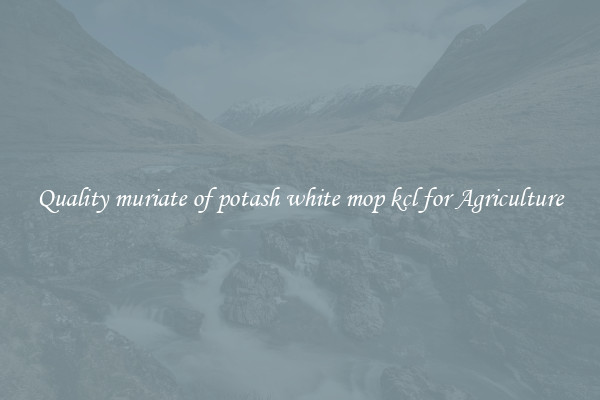Quality muriate of potash white mop kcl for Agriculture
Muriate of potash, also known as potassium chloride (KCl), is a key nutrient for plant growth and is used widely in agriculture as a fertilizer. When it comes to choosing the right muriate of potash for agricultural use, quality is of utmost importance. White mop KCl, which stands for "white muriate of potash," is a premium grade of KCl known for its high purity and effectiveness in promoting plant growth.

White mop KCl is a highly refined form of potassium chloride, which has been processed to remove impurities and ensure a high level of purity. This makes it an ideal choice for agricultural use, as it provides plants with a concentrated source of potassium without the risk of contamination from other substances. The high purity of white mop KCl also means that it is more readily available for plant uptake, ensuring that plants receive the nutrients they need to thrive.
In addition to its high purity, white mop KCl is also prized for its uniform particle size and consistency. This ensures that the fertilizer can be evenly distributed in the soil, promoting optimal nutrient uptake by plant roots. The uniformity of white mop KCl also makes it easier to handle and apply, reducing the risk of uneven application and nutrient deficiency in crops.
One of the key benefits of using white mop KCl in agriculture is its high potassium content. Potassium is a vital nutrient for plant growth, playing a crucial role in enzyme activation, osmoregulation, and nutrient transport within plants. By providing plants with a readily available source of potassium, white mop KCl helps to promote healthy root development, improve plant growth and yield, and enhance resistance to stressors such as drought and disease.
Overall, white mop KCl is a premium grade of muriate of potash that offers numerous benefits for agriculture. Its high purity, uniform particle size, and high potassium content make it an ideal choice for promoting healthy plant growth and maximizing crop yields. By choosing quality white mop KCl for agricultural use, farmers can ensure that their crops receive the essential nutrients they need to thrive and prosper.

View details

View details

View details

View details








